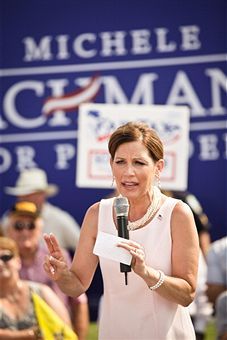 What on earth is ‘Dominionism’? Lots of Americans who first heard the word
just a few weeks ago are suddenly feeling very angry about it. Liberals say that the US constitution is facing a ‘Dominionist threat’ in the form of Michele Bachman and Rick Perry, two Republicans running for president in 2012. Christian
conservatives, meanwhile, cry prejudice: they accuse a secularist elite of conducting a witch-hunt against Christians in politics.
What on earth is ‘Dominionism’? Lots of Americans who first heard the word
just a few weeks ago are suddenly feeling very angry about it. Liberals say that the US constitution is facing a ‘Dominionist threat’ in the form of Michele Bachman and Rick Perry, two Republicans running for president in 2012. Christian
conservatives, meanwhile, cry prejudice: they accuse a secularist elite of conducting a witch-hunt against Christians in politics.
What’s the fuss? Dominionism is, we are told, a school of evangelical thought that aims to impose Biblical law over secular government. It is to nutty Evangelicals what Shariah Law is to
Islamists, a way of achieving theocracy on earth. Dominionism apparently takes Genesis 1:26 as its creed:‘have dominion over the fish of the sea and over the birds of the heavens and
over the livestock and over all the earth and over every creeping thing that creeps on the earth.’
Creepy, eh? Fear of Dominionism spread last month after Ryan Lizza (wrote a profile of Michele Bachman for the New Yorker. Lizza presented Bachman as an unhinged zealot (not hard) and tried to show
that her worldview was informed by a string of fanatical Dominionist theologians, all bent on overthrowing the secular order in favour of theocratic one, through violent means if necessary.
The article rang plenty of secular alarm bells. As did the emergence of Rick Perry, Governor of Texas and a sort of politician/pastor hybrid, as a much more plausible candidate than Bachman.
Liberals were quick to attach the Dominionist label to him, too. In a Texas Observer article entitled ‘Rick Perry’s Army of God’, Forrest Wilder described his association with the
New Apostolic Reformation movement, which, he said, urges believers to ‘fashion themselves on prophets and apostles. ‘What makes the New Apostolic Reformation movement so potent,’
wrote Wilder, ‘is its growing fascination with infiltrating politics and government.’
All of a sudden Dominionists were everywhere. Bill Keller produced a piece in the New York Times urgently demanding that all candidates should respond to a set of questions about their beliefs. ‘We have the most theocratic Republican field in American history,’ blogged Michele Goldberg for the Daily Beast, ‘and…the concept of Dominionism is reaching mainstream audiences.’
Be afraid! It’s worth noting, however, that those who wail against Republican ‘theocratic rhetoric’ are more than willing to lift their hearts when Democratic candidates press the God button. Barack Obama’s 2008 campaign message was an obviously spiritual one (Faith, hope, change, and the least of those, it turned out, was change). But few minded because it came from him, an urbane black man, not a white southerner who liked executing criminals.
I doubt many Democrats shouted ‘inappropriate” when President Bill Clinton, speaking in Washington’s Metropolitan Baptist Church, quoted Ephesians and asked ‘is my destiny caught up in
yours? Are we part of the same family of God? It is not enough to say we are all equal in the eyes of God. We are all also connected in the eyes of God.’ And nobody accused Jimmy Carter of
Dominionism when he said, ‘We have a responsibility to try to shape government so that it does exemplify the teaching of God.’
Most liberal-minded people would be more comfortable with Obama or Carter’s idea of spiritual healing than Rick Perry’s. But it’s not fair to allow some pols to preach faith, then
shout ‘theocracy!’ at others who do the same.
The point is that in America, for all the separation of church and state, politicians cannot leave God alone because so many Americans cannot help but feel that their nation’s destiny is bound up with His design. The panic over Dominionism is not a response to some sinister shift in American politics; it is more about people loathing things they don’t understand and mongering fear ahead of an important election.







Comments